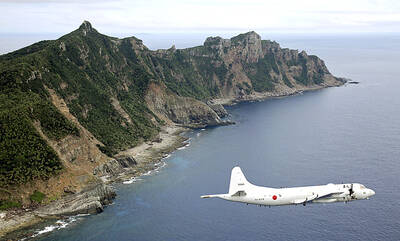A US official on Saturday reaffirmed Washington’s stance toward Taiwan, after China’s Xinhua news agency reported that US President Barack Obama expressed the US’ “opposition” to “Taiwanese independence” in a meeting with Chinese President Xi Jinping (習近平) in China.
“Our position is consistent and longstanding... We remain firmly committed to our ‘one China’ policy based on the three joint communiques and the Taiwan Relations Act,” White House National Security Council spokesman Myles Caggins said in an e-mailed statement.
Obama and Xi held a meeting in Hangzhou on the eve of the G20 summit taking place there, and according to Xinhua, Xi urged the US to honor its commitment to the “one China” policy and the three joint communiques, and safeguard the peaceful development of cross-strait ties and the overall interests of Sino-US cooperation with deeds.
According to Xinhua, Obama responded that the US “opposes all attempts aimed at seeking Taiwanese independence,” and reaffirmed that Tibet belongs to China.
“Our fundamental interest is in peaceful and stable cross-strait relations,” said Caggins, who is among the White House staff accompanying Obama in China.
“We believe that cross-strait issues should be resolved peacefully in a manner, pace and scope acceptable to people on both sides of the Strait,” Caggins added.
However, Caggins did not reveal the details of the meeting between the two leaders.
Earlier this year, Daniel Kritenbrink, senior director for Asian Affairs at the US National Security Council, said that Chinese officials often mention the Taiwanese issue during meetings with their US counterparts, and if US officials comment on the issue, they say: “We do not support Taiwanese independence.”

MISINFORMATION: The generated content tends to adopt China’s official stance, such as ‘Taiwan is currently governed by the Chinese central government,’ the NSB said Five China-developed artificial intelligence (AI) language models exhibit cybersecurity risks and content biases, an inspection conducted by the National Security Bureau (NSB) showed. The five AI tools are: DeepSeek, Doubao (豆包), Yiyan (文心一言), Tongyi (通義千問) and Yuanbao (騰訊元寶), the bureau said, advising people to remain vigilant to protect personal data privacy and corporate business secrets. The NSB said it, in accordance with the National Intelligence Services Act (國家情報工作法), has reviewed international cybersecurity reports and intelligence, and coordinated with the Ministry of Justice Investigation Bureau and the National Police Agency’s Criminal Investigation Bureau to conduct an inspection of China-made AI language

LIMITS: While China increases military pressure on Taiwan and expands its use of cognitive warfare, it is unwilling to target tech supply chains, the report said US and Taiwan military officials have warned that the Chinese People’s Liberation Army (PLA) could implement a blockade within “a matter of hours” and need only “minimal conversion time” prior to an attack on Taiwan, a report released on Tuesday by the US Senate’s China Economic and Security Review Commission said. “While there is no indication that China is planning an imminent attack, the United States and its allies and partners can no longer assume that a Taiwan contingency is a distant possibility for which they would have ample time to prepare,” it said. The commission made the comments in its annual

‘TROUBLEMAKER’: Most countries believe that it is China — rather than Taiwan — that is undermining regional peace and stability with its coercive tactics, the president said China should restrain itself and refrain from being a troublemaker that sabotages peace and stability in the Indo-Pacific region, President William Lai (賴清德) said yesterday. Lai made the remarks after China Coast Guard vessels sailed into disputed waters off the Senkaku Islands — known as the Diaoyutai Islands (釣魚台) in Taiwan — following a remark Japanese Prime Minister Sanae Takaichi made regarding Taiwan. Takaichi during a parliamentary session on Nov. 7 said that a “Taiwan contingency” involving a Chinese naval blockade could qualify as a “survival-threatening situation” for Japan, and trigger Tokyo’s deployment of its military for defense. Asked about the escalating tensions

DISPUTE: A Chinese official prompted a formal protest from Tokyo by saying that ‘the dirty head that sticks itself out must be cut off,’ after Takaichi’s Taiwan remarks Four armed China Coast Guard vessels yesterday morning sailed through disputed waters controlled by Japan, amid a diplomatic spat following Japanese Prime Minister Sanae Takaichi’s comments on Taiwan. The four ships sailed around the Senkaku Islands — known as the Diaoyutai Islands (釣魚台) to Taiwan, and which Taiwan and China also claim — on Saturday before entering Japanese waters yesterday and left, the Japan Coast Guard said. The China Coast Guard said in a statement that it carried out a “rights enforcement patrol” through the waters and that it was a lawful operation. As of the end of last month,